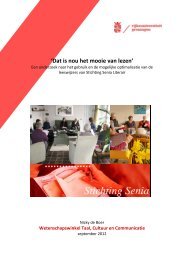Download het boekje - Wetenschapswinkel Taal, Cultuur en ...
Download het boekje - Wetenschapswinkel Taal, Cultuur en ...
Download het boekje - Wetenschapswinkel Taal, Cultuur en ...
You also want an ePaper? Increase the reach of your titles
YUMPU automatically turns print PDFs into web optimized ePapers that Google loves.
No picnic – problems with foreign language acquisition<br />
Second language acquisition is a chall<strong>en</strong>ge to many people. There are many problems one can<br />
<strong>en</strong>counter while doing just that. Learning completely new grammatical rules repres<strong>en</strong>ts an<br />
<strong>en</strong>ormous task. In addition, the second language will in all likelihood contain differ<strong>en</strong>t sounds<br />
than one is used to from their mother tongue. Variables such as intonation or unfamiliar<br />
phonemes can display an issue that is not easily overcome. Two of the stud<strong>en</strong>ts, Anna and<br />
Marie, m<strong>en</strong>tioned that the pronunciation of foreign languages is one of their biggest problems.<br />
They also described this problem as the main reason for their inhibition to speak that language.<br />
On top of that, all of the stud<strong>en</strong>ts indicated that the pronunciation of Dutch has be<strong>en</strong> the main<br />
obstacle hindering them from freely communicating with the locals in their <strong>en</strong>vironm<strong>en</strong>t. They<br />
don’t feel comfortable <strong>en</strong>ough to try.<br />
As m<strong>en</strong>tioned before, the learner has to<br />
acquire a whole new set of rules. Especially the<br />
vocabulary has to be learned by heart. So in<br />
conclusion, learning a new language is a task<br />
that demands a lot of commitm<strong>en</strong>t and<br />
requires devotion. That can cause problems.<br />
Marie, Anna, as well as Kathrin said that the<br />
lack of motivation to study the vocabulary and<br />
grammar especially outweighs their interest of<br />
the language on a regular basis.<br />
The effect of negative experi<strong>en</strong>ces is<br />
just as influ<strong>en</strong>tial. Criticism influ<strong>en</strong>ces the<br />
whole feeling towards the language and makes the learner doubt their abilities, ev<strong>en</strong> if they do<br />
have measurable skills concerning language acquisition. The motivation is impaired and the<br />
self-esteem is damaged. Overcoming those negative comm<strong>en</strong>ts takes a while, restoring the<br />
faith in oneself ev<strong>en</strong> longer. In contrast Anna who failed in English and Spanish in secondary<br />
school has overcome this experi<strong>en</strong>ce and gained confid<strong>en</strong>ce over the last years. According to<br />
her the months abroad particular helped her trem<strong>en</strong>dously. “After my experi<strong>en</strong>ces with English<br />
at school, I just didn’t dare to speak. But in New Zealand I just started speaking because I had<br />
to. Compared to the other foreign stud<strong>en</strong>ts, I had a better starting level, so I never got the<br />
feeling I should rather not speak English.”<br />
Multilingualism – positive impressions<br />
Once the stud<strong>en</strong>ts got to think about multilingualism, no negative effects or impressions on<br />
their linguistic abilities were m<strong>en</strong>tioned. Although there might occur some slight problems that<br />
go alongside with speaking differ<strong>en</strong>t languages like the struggle of learning a new grammatical<br />
system and vocabulary, the positive attitude towards multilingualism has a reason. The<br />
stud<strong>en</strong>ts, but also researchers share the opinion that the ability to speak more languages not<br />
only helps to understand other people and cultures better, but also lets one discover their own<br />
skills and raises the awar<strong>en</strong>ess towards a great many things. So, should one consider learning<br />
another language? From a sociological, psychological and linguistic point of view it is highly<br />
<strong>en</strong>couraged. It repres<strong>en</strong>ts the opportunity to get in touch with an interesting ability humans are<br />
capable of.<br />
54 | W i e g e e n v r e e m d e t a l e n k e n t , w e e t n i e t s v a n z i j n e i g e n t a a l




